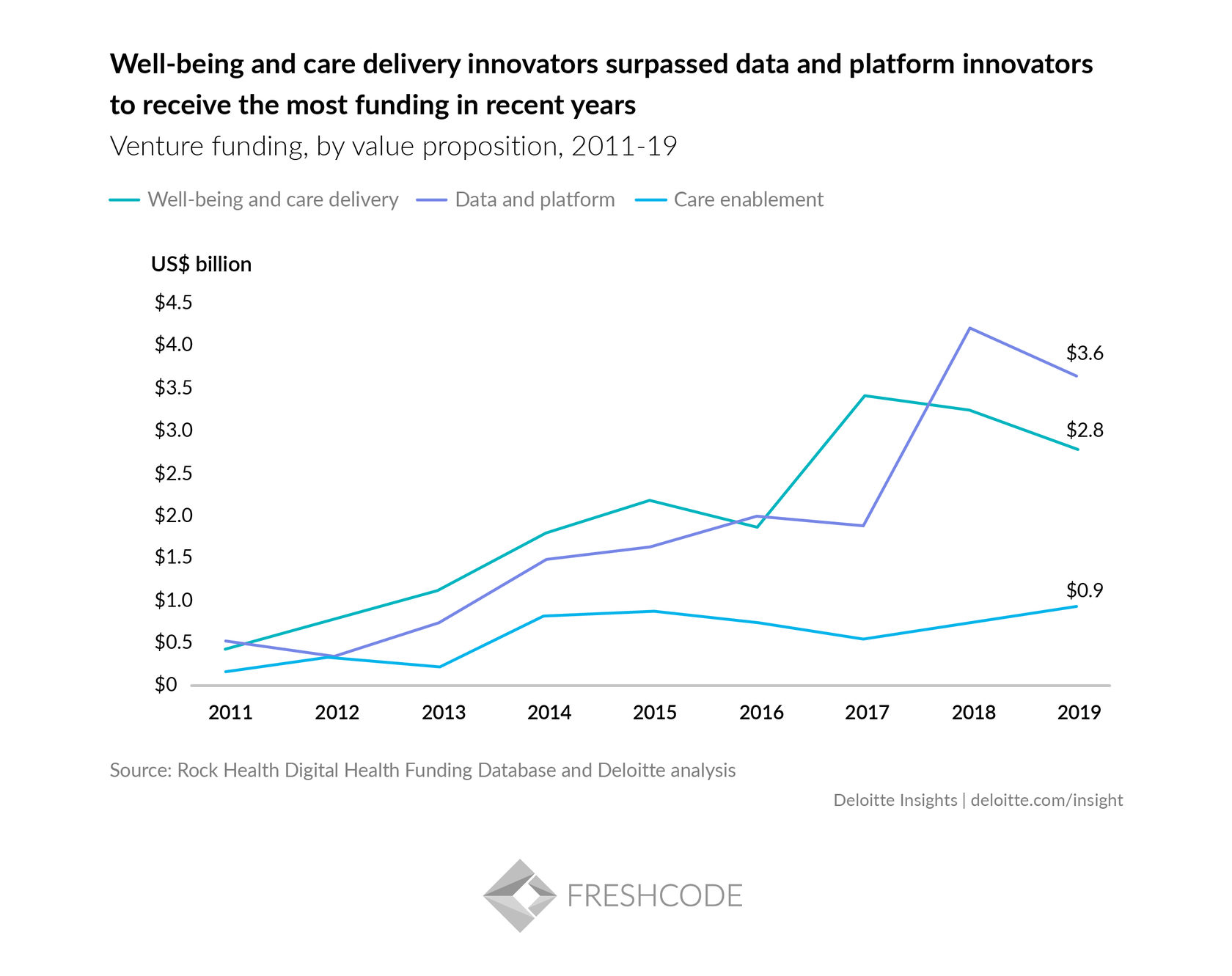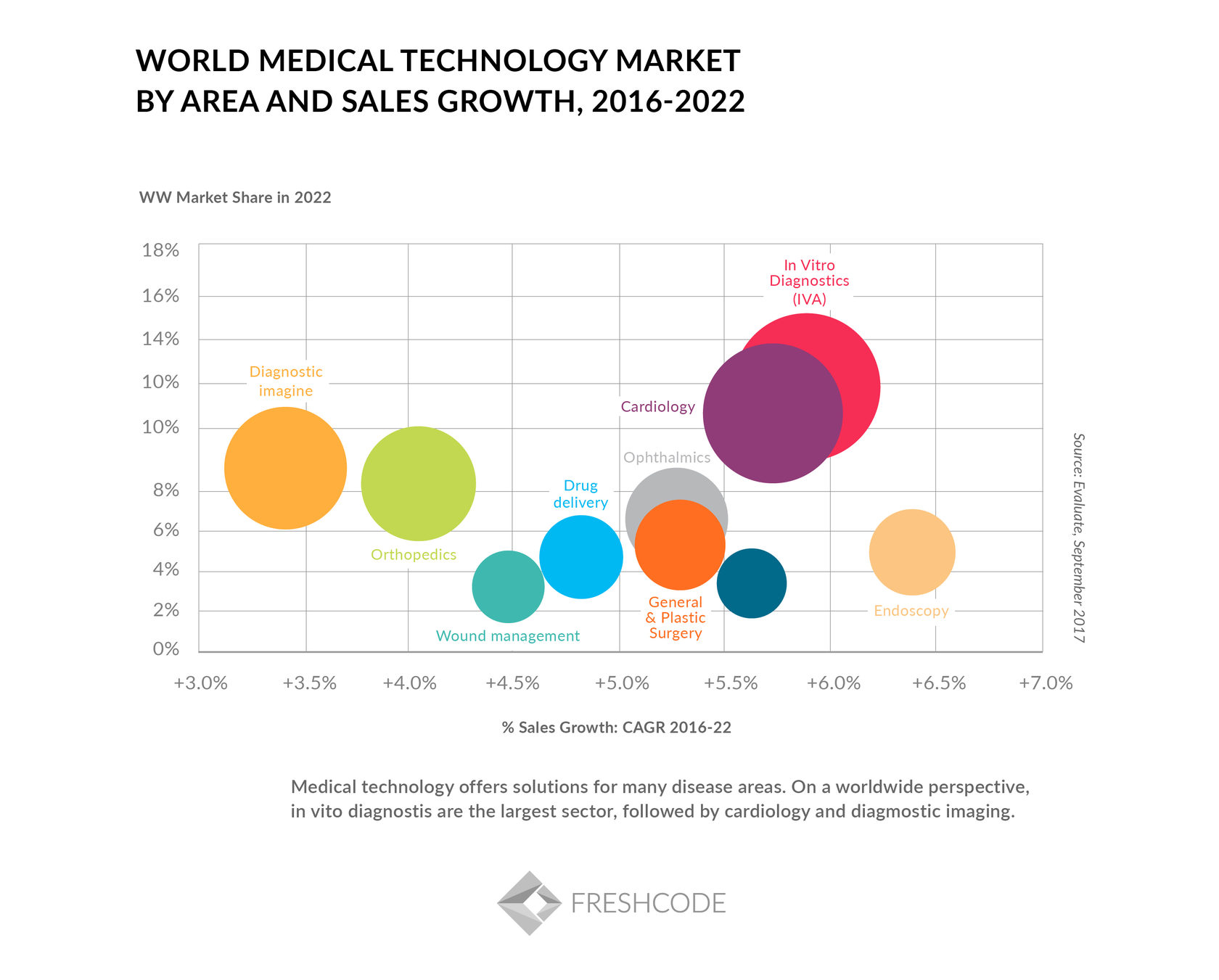Healthcare startup numbers are on the rise
According to Statista, the medical technology market has exceeded $430 billion, and while the United States are still in the lead when it comes to MedTech device manufacturing (43% of the market), European countries are not far behind (29%). Japan (7%), China (6%), and Canada (2%) round up the top-5 MedTech destinations. Meanwhile, EU states spend 10% of the gross domestic product on healthcare, and 7.2% are spent on medical technology. These numbers translate into €203 per capita across the EU.
The European MedTech market consists of over 27,000 companies, 95% of which are small and medium-sized businesses. Their collective workforce exceeds 675,000 people, most of whom live in Germany, the UK, France, Italy, and Switzerland.

According to Deloitte, MedTech investment has been steadily increasing since 2011 and exceed $7.4 billion in 2019. Interestingly, data and platform MedTech innovators who have been outperforming other categories, have seen a decline since 2018. Meanwhile, wellbeing and care delivery startups have seen increased popularity among investors.

Health technology adoption factors
With the medical technology market on a steadily ascending trajectory, let's take a look at the crucial factors that drive physical and mental health startups development and adoption. Four essential conditions of MedTech progress include:
{{blognn10-1="/custom-block-to-blog/three-page"}}
Trending technologies in medicine
Many medical technology investors are looking for differentiating technology when choosing among startups seeking funding. However, every other company does not base their solution on a particular technology, instead choosing to promote their products' other strengths. According to Deloitte, the most founded startups of 2019 rely on two technologies:
- <medium>Machine learning, artificial intelligence, deep learning.<medium> AI-powered algorithms can process Big Data and become part of preventative medical treatments. However, medical professionals often doubt the validity of machine-generated decisions, as algorithms rely on black-box
- <medium>Internet of things.<medium> Devices with network capabilities are lowering medical expenses and enabling remote patient monitoring. However, significant discrepancies among IoT protocols and standards might cause troubles for manufacturers when healthcare organizations struggle with integration and synchronization.

Medical technology adoption constraints
The convoluted money flow in healthcare is one of the reasons for the industry's poor dynamics.
Deloitte's research demonstrates that out of 895 healthcare technology startups founded between 2010 and 2019, only 86 conducted an IPO or were acquired. These numbers amount to less than 10% of MedTech startups. While 2019 was more fruitful for technology in healthcare with five successful IPOs over the course of the year, many innovators struggle for funding.
The reasons behind investors' reluctance to invest in medical technology include:
{{blognn10-2="/custom-block-to-blog/three-page"}}
None of these medical technology adoption barriers are insurmountable. Still, health IT startups and innovators should keep them in mind and conduct in-depth pre-mortem analysis and other risk mitigation procedures to lower the chances of failure.
Healthtech companies' potential in 2020 and beyond
Medical technology forecasts might have been optimistic at the end of 2019, but the pandemic and subsequent social distancing protocols had a negative impact on the industry. MedTech startups specializing in elective procedures and routine diagnostics took a severe hit in the first quarter of 2020, according to a report by MedTechDive. Medtronic, LabCorp, BD, Stryker, and other companies reported losses from 35% to 70% in demand and revenue.
Pandemic restrictions might not affect medical software developers as much, but most businesses are seeing a decline in demand as recession hits more households. While many patients prefer to stay away from medical facilities for at least a few months to prevent contagion, those who lose jobs are simultaneously left without medical insurance, and therefore, access to MedTech advances.

Still, MedTech startups could transform the pandemic crisis into a growth opportunity and implement measures to prevent similar risks in the future. According to Accenture, potential growth avenues include:
- Advance diagnostics and monitoring with a focus on increased throughput and infection control, especially in places of high foot traffic, including airports, malls, etc.
- Simplified design and feature set for faster production and launch, as well as easy at-home use by patients instead of medical professionals.
- Streamlined supply and delivery chain to ensure life-sustaining supplies are readily available to everyone in need.
- Digitization of business processes and medical help to provide patients with access to professional help without quality trade-offs.
Medtech overiew at a glimpse
I wouldn't be able to share every pertinent bit of information about MedTech in one post. It is a fascinating industry with huge potential, and I hope I've managed to provide a solid overview for you. My five major takeaways from this research are:
- Medical technology has become a striving market between 2011 and 2019, with a worldwide valuation of over $430 billion and promising growth projections.
- Network connectivity, hardware miniaturization, increased processing, and data storage capabilities are the main technological factors driving MedTech innovation.
- IoT, AI, and machine learning are the prominent technologies behind the most-funded healthcare startups of 2019, despite experts' concerns.
- Security concerns, unclear money generation models, and lengthy approval processes are among the critical adoption barriers that hold both medical innovators and investors back.
- The pandemic crisis hit the MedTech industry hard, though many software developers were mostly spared and could find further opportunities for growth in a post-social distancing era
Check out Freshcode software development services if you want to stay ahead of the competition in the future crises. Here you can book a free consultation.
{{about-slobozhan-red="/material/static-element"}}









